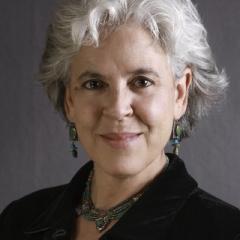
Spotlight on Cantor Marsha Attie
ACC member Cantor Marsha Attie has been serving Congregation Emanu-El in San Francisco, CA, since 1998. She is also a composer and recording artist.
Tell us a little about your compositions and what it means to be a composer.
I write a lot of Jewish music, but I also write non-Jewish music. I’m simply a composer. I have had some things published in the Shabbat Anthology and in the Ruach compilations. My songs have also appeared on several CD compilations by Craig Taubman, Ruach, The Spirit Series, etc.
Where do you find inspiration for your compositions and your writing?
Some pieces I actually dream. I will dream songs, then wake up and quickly record them on my phone or recorder. In the morning I will have a listen and see if it’s useful. I had a couple of songs that came to me completely in one dream. Another way [music comes to me] is when I’m feeling something really strongly. If I have a welling up in my heart, sometimes the music comes out from that place. My music also comes from being in nature, like when I’m hiking or walking. I’ve even had it come to me while driving. I read once somewhere, maybe it was Steven Spielberg, who said that the best ideas he’s had was while he was driving. I have heard and read things about the creative process sometimes coming alive when you’re doing something else, something in you gets free to express. And I find that for myself, too. Sometimes I bring text with me in the car and when I’m driving, part of a song comes out.
I believe that many songs already exist in the ether and what happens is that we end up hearing them. It’s like when I’m dreaming, it’s there and I hear it. I can’t imagine a world where some songs wouldn’t be here. It’s like the Beatles song, Yesterday, it just had to exist. It was there and they heard it.
What’s the best part about being a cantor?
The most obvious thing is that I love to sing. It’s great. I find that the more experience and the older I get, the more I love reveling in the feeling of opening my heart in song. I enjoy opening up and letting it out. Another thing I like is my synagogue team. I love my working with my clergy team, the larger supportive synagogue team and working with a loving and supportive board.
What influenced you to be a Cantor?
I was a professional dancer. I was always a singer. I started getting work in summer camps and synagogues as a song leader. One thing led to another and I started doing cantorial work. When I first came to Temple Emanu-El in San Francisco I was hired as the song leader/cantorial soloist. About six years ago, the board came to me and asked if I’d like to become a cantor and they offered to make that possible. They sent me to school. Even then I wasn’t sure, but I went ahead. I was already a grown up with a full-time job and a child at that point. But I decided to go forward. I flew to Los Angeles two days a week to attend the Academy of Jewish Religion Los Angeles. It was fun. At this point in my life being a student is a bit like being on vacation!
What do you see as the biggest challenge facing the cantorate today and in the future?
Sometimes we get caught up in presentation. We worry more about performance than spiritual authenticity for our congregants. Another problem is being relevant in people’s lives today. I work for a large congregation and it’s about creating authentic communities. We do a lot of work to create many small communities to support hospitality and support.
What is one thing you’d like to share with us that we might not know about you?
When I was young, I wanted to be a filmmaker. I enjoy Quentin Tarantino’s films, and films by the Coen brothers; I love dark comedy.

